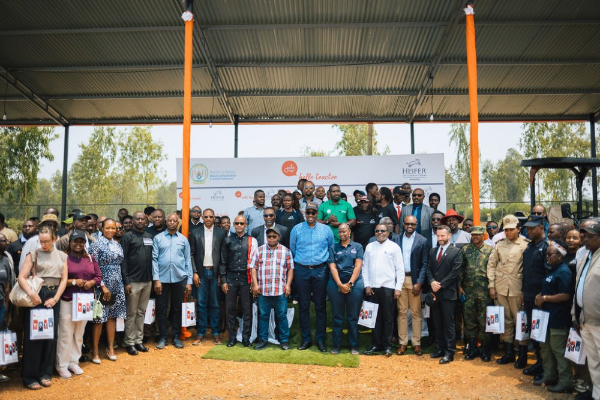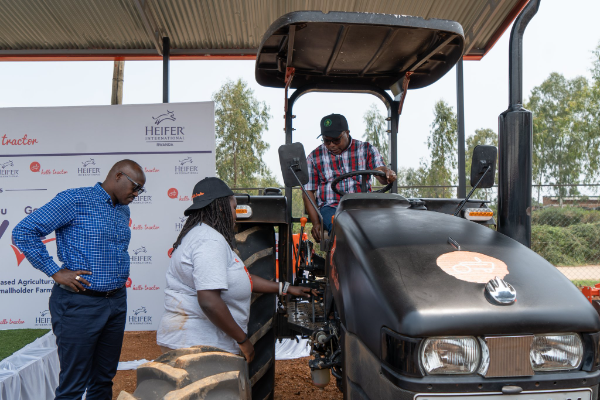Heifer International Rwanda, in collaboration with Hello Tractor and the Government of Rwanda, has launched a second mechanisation hub in Nyagatare District, advancing efforts to equip smallholder farmers with modern, climate-smart farming tools and services.
This new facility, established under the Rwanda Dairy Market Systems (RDMS) project, builds on the success of the first hub launched in Kayonza District in November 2024.
It aims to expand access to affordable mechanisation through a combination of modern tractors, operator training, and a flexible Pay-As-You-Go (PAYG) model requiring just a 5 percent down payment, with the remainder paid over five years via income generated through service provision.
At the launch event, officials, partners, and farmers witnessed live tractor demonstrations, equipment handovers, and testimonies from beneficiaries that highlighted the transformative potential of mechanisation.
Verena Ruzibuka, Country Director of Heifer International Rwanda, underscored the early impacts of the initiative: in just seven months—across agricultural seasons A and B—the project has deployed 15 tractors, supported over 6,000 farmers, and helped cultivate more than 3,000 hectares.
“Smart farming solutions like this are designed to tackle long-standing challenges—limited equipment access, labor-intensive methods, and low productivity—while embedding sustainable, climate-smart practices into the agricultural sector,” Ruzibuka said.
She added that the hubs are not just distribution points for tractors but are creating a new generation of rural entrepreneurs—operators, booking agents, technicians—who will turn agriculture into a viable business sector.

Stephen Gasana, Mayor of Nyagatare, provided context on the district’s agricultural landscape: 59.3 percent of residents are crop farmers, and 39.2 percent are cattle keepers. Yet, only 7,654 hectares of the 83,190 hectares cultivated in the 2024/25 season benefitted from tractor use—limiting yields due to incomplete planting and delayed operations.
He stressed that enhancing access to mechanisation will support government policies such as cultivating 70 percent of grazing land, a target previously missed due to labor constraints.
Folu Okunade, COO of Hello Tractor, emphasized the broader scale of the challenge: Africa needs an estimated 5 million tractors, representing a $122 billion opportunity.
In Rwanda, only about 250 tractors are currently active, but approximately 26,000 are needed to reach the global average—equating to a $700 million opportunity.
He noted that mechanisation not only improves efficiencies but also creates jobs and strengthens livelihoods.
Telesphore Ndabamenye, Rwanda’s Minister of State for Agriculture and Animal Resources, officiated the launch and reiterated that mechanisation is a cornerstone of the National Strategy for Transformation of Agriculture (PSTA 5).
The strategy promotes modern, environmentally friendly technologies to enable timely cultivation of larger plots, enhance productivity, and generate rural jobs—all key to increasing farmer incomes). He encouraged youth participation, hoping the Nyagatare hub would set a precedent for expansion across other districts.
Farmers themselves voiced powerful endorsements. Olivier Niyitegeka, from Kamate Village, Karangazi Sector, reported harvesting 7.7 tonnes from one hectare using a tractor—compared to just nine tonnes from two hectares of manual cultivation.
At just Rwf 85,000 per hectare, the service proved affordable, improved soil water retention, and saved time—especially during hot weather.
Meanwhile, Jackson Rutayisire, a livestock farmer, said reliable tractor services allowed him to expand his herd from eight to ten cows. His daily milk yield rose from 120 to 170 litres, boosting his income from Rwf 48,000 to Rwf 68,000—a 41.7 percent increase in productivity and a 74.1 percent cost-benefit improvement.
Efficient fodder production has helped him maintain output even during dry periods, making his farm more resilient and scalable.








